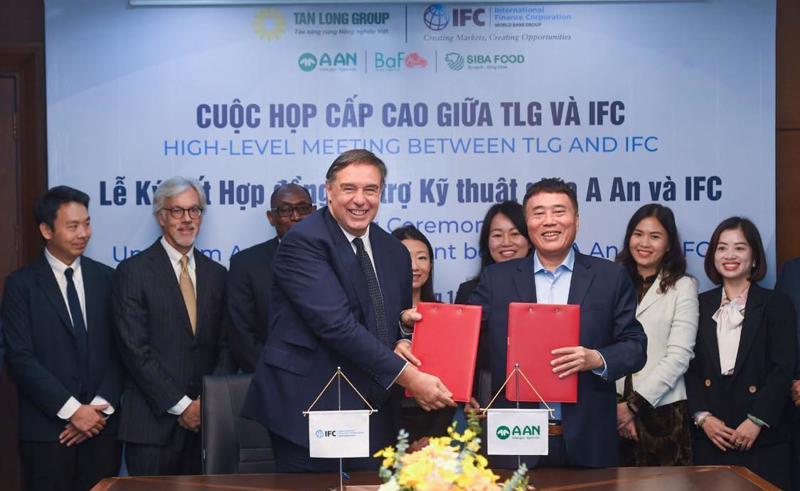The International Finance Corporation (IFC), a member of the World Bank Group, is aiding the A An Food Joint Stock Company in improving the quality and sustainability of its rice production in order to enhance the value and competitiveness of Vietnam’s agricultural sector.
This new partnership aims to increase incomes for farmers and mills throughout the company’s supply chain while also mitigating greenhouse gas emissions in rice farming. Under the new advisory agreement, the IFC will help the A An Food JSC, the rice business subsidiary of the Tan Long Group, a key agribusiness player in Vietnam, develop a safe, low-carbon, high-quality, and sustainable rice supply chain. This includes supporting thousands of rice farmers and mills in adopting food safety measures, food loss prevention, and low-carbon practices, lowering production costs by up to 15 per cent and reducing the post-harvest loss rate by half, to below 8 per cent by 2030.
“The IFC’s support will help the Tan Long Group develop a sustainable rice production strategy to realize our goal of supplying up to 5 million tons of green, safe, and high-quality rice within the next ten years,” said Mr. Truong Sy Ba, Chairman of the Tan Long Group. “As a leading rice processor, distributor, and exporter, we are keen to adopt low-carbon production practices in line with international standards, reducing the sector’s emissions and boosting the country’s climate and economic resilience.”
The announcement of the new partnership was made as the IFC’s Regional Vice President for Asia and the Pacific, Mr. Riccardo Puliti, arrived in Vietnam for a two-day visit, to focus on the country’s transition to a productive, high-value, and low-carbon growth model. At a meeting with senior government officials, Mr. Puliti reiterated the IFC’s commitment to supporting Vietnam’s development and climate goals by boosting productivity and sustainability, facilitating climate business markets and mobilizing international financing for green and resilient growth.
“As Vietnam aims to become a high-income economy by 2045, boosting the agriculture sector’s value and competitiveness by improving production, reducing losses, and enhancing safety, quality, and sustainability will be critical to make the sector continue to be the key contributor to economic growth and job creation,” he said. “By supporting local agribusinesses like the Tan Long Group to develop local food systems that are greener, more productive, and resilient to a changing climate, we are not only helping strengthen the country’s food supply chain but also reducing emissions from agriculture, enabling Vietnam to achieve net-zero emissions by 2050.”
Active in Vietnam for more than 20 years, the IFC has been a key partner on the country’s development journey and that of its private sector, providing billions of dollars to local businesses to grow and create jobs since its first in-country investment in 1994. Sustainability and climate are a priority for the IFC in Vietnam, as it has committed over $900 million in long-term finance to support climate-related projects in the country. Recently, the IFC invested up to VND3.5 trillion ($150 million) in Vietnam’s first local currency sustainability-linked bonds, issued by the BIM Land Joint Stock Company and its subsidiary the Thanh Xuan Joint Stock Company, to allow the developers to improve water conservation and energy efficiency in three of their hospitality assets.









 Google translate
Google translate